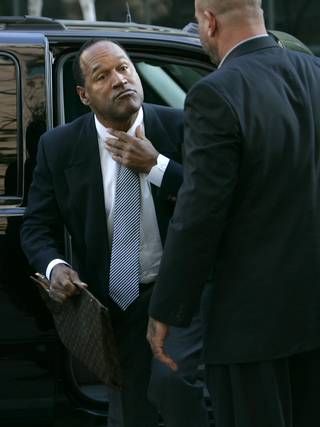Wednesday, Sept. 17, 2008 | 1:35 p.m.
Sun coverage
Twitter updates
Beyond the Sun
The jury in O.J. Simpson’s robbery/kidnapping trial heard more details Wednesday about the audio recordings at the center of the case.
Simpson and his former golfing buddy, Clarence “C.J.” Stewart, both are charged with a dozen robbery, weapons and kidnapping-related offenses. The charges stem from a run-in with two memorabilia dealers, Alfred Beardsley and Bruce Fromong, in a Las Vegas hotel last year.
A third memorabilia dealer who arranged the meeting that day, Thomas Riccio, captured several audio recordings during the time leading up to and after the altercation, as well as an audio account of the six-minute confrontation inside the hotel room.
FBI audio analyst Kenneth Marr told the court that he was not able to authenticate the recordings on Riccio’s digital recorder.
“The bottom line of my results from … the test files … was that I would not be able to determine if the digital files were or were not altered,” he said. “I cannot say whether or not the files were altered,“ Marr said.
He was cross-examined and videotaped on Aug. 25 because he had previously-made commitments that prohibited him from attending court this week.
The jury heard the first 30 minutes of his testimony Tuesday and watched the remainder this morning.
The files Marr examined in his laboratory were what he referred to as “derivative evidence:” digital copies of the original files.
Stewart’s attorney, E. Brent Bryson, challenged the analyst and asked him how he could verify the original files’ authenticity using a digital duplicate.
Bryson also challenged the chain of custody of Riccio’s audio recordings. While they were captured during the weekend the alleged robbery took place, on Sept. 13, 2007, police did not become aware of the recordings of the alleged events until more than a week later.
He said Riccio’s audio device was “inherently untrustworthy not only because of the manner in which the recording was made, but (because) there’s a chain of custody problem for that eight-day period.”
Las Vegas police officer Andy Caldwell first learned of Riccio’s recordings eight days after the run-in at Palace Station on an Internet Web site. Riccio didn’t mention the digital recorder when police attended the scene and instead of turning it over to investigators, the enterprising Corona, Calif.-based collectibles dealer sold the audio for more than $100,000 to the gossip Web site, TMZ.
Marr said he found “over-recording” in several areas of the audio.
“There was other audio underneath that audio that I can see,” he said, noting that “it might” mean they were manipulated.
He also said it wasn’t possible to tell the difference between the files he was given and the files he downloaded, digitally manipulated and uploaded again: The files appeared to be the same.
This means it would have been possible for Riccio to get the files off his recorder and onto a computer, edit them, and put them back onto his recorder without anyone knowing.
”You can’t vouch for its authenticity … you can’t say to me that there weren’t any edits or any manipulations of that recording,” Glass said, summarizing before dismissing Marr from the stand.
Before adjourning for lunch, Glass denied Stewart’s lawyers’ most recent motion to sever their client from the trial to allow him to be tried separately from Simpson.


Join the Discussion:
Check this out for a full explanation of our conversion to the LiveFyre commenting system and instructions on how to sign up for an account.
Full comments policy